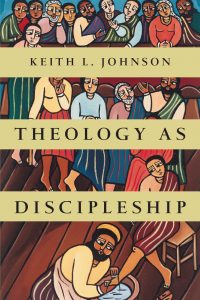 Keith Johnson’s Theology as Discipleship arose from his work in the classroom in which students sometimes asked concerning the value and relevance of theological study. His response is to “argue that the discipline of theology and a life of discipleship to Jesus Christ are integrally related because the practice of theology is one of the ways we participate in the life of the triune God” (12). His argument unfolds over seven chapters, beginning in the first with a historical narrative to explain how Christian theology became separated from Christian faith and the life of the church and discipleship; that is, it became subject to canons of thought and presuppositions alien to its own confession. In the early centuries of Christianity the context of theology was the church, and its practice was related to pastoral and devotional concerns, and faithful life in the world. The presupposed connection between theology and discipleship began slowly to change, however, during the medieval period when the discipline of theology became part of the university curriculum. This change accelerated in the modern era as the role of the university and what counted as academic learning evolved.
Keith Johnson’s Theology as Discipleship arose from his work in the classroom in which students sometimes asked concerning the value and relevance of theological study. His response is to “argue that the discipline of theology and a life of discipleship to Jesus Christ are integrally related because the practice of theology is one of the ways we participate in the life of the triune God” (12). His argument unfolds over seven chapters, beginning in the first with a historical narrative to explain how Christian theology became separated from Christian faith and the life of the church and discipleship; that is, it became subject to canons of thought and presuppositions alien to its own confession. In the early centuries of Christianity the context of theology was the church, and its practice was related to pastoral and devotional concerns, and faithful life in the world. The presupposed connection between theology and discipleship began slowly to change, however, during the medieval period when the discipline of theology became part of the university curriculum. This change accelerated in the modern era as the role of the university and what counted as academic learning evolved.
Theologians felt pressure to justify their conclusions according to the academic criteria that governed the university. This meant that rather than starting with faith—which might distort their ability to assess evidence rationally—they had to begin with universally accepted premises and employ the methods of critical reason. No longer could they appeal to the authority of the Bible or the church’s tradition to defend their claims (29).
This pressure intensified as modernity progressed, and Johnson notes a further shift that occurred with Schleiermacher, who argued that theologians should “demonstrate that the church’s practices are a ‘necessary element for the development of the human spirit,’” and that they should employ a genuinely deliberative character in their work (30, citing Schleiermacher, Brief Outline of Theology as a Field of Study, 10-11, 97). Theologians must now be scholars in addition to saints, and their work was not simply for the church but for the welfare of the modern state, and so they were accountable not only to the church but also to the university. The best theologians had always engaged other disciplines, seeking to draw them into the intellectual framework of Christian faith. Now the direction of engagement shifted: “Theologians interacted with these same disciplines not in order to reframe them in light of their faith but to secure theology’s place in the academy alongside every other discipline” (31).
Formerly, theologians had pursued theological training in order to acquire knowledge, habits and skills that would shape them into the pattern of Jesus Christ for the sake of their service to the church. … Now, with the discipline of theology housed primarily in the university, the primary goal of theological education was to provide students with the technical skills they needed to perform responsible critical enquiry so that the church’s faith and practice could be brought in line with the standards of critical reason (31-32).
Thus Johnson proposes that theology begin with its own distinctive confession—the lordship of Jesus Christ according to Romans 10:9—and work itself out from there in accordance with its own rationality and in dialogue with other disciplines. In Johnson’s view theology must be both faithful and academic; to require a division between these is to misunderstand the nature and practice of theological inquiry. The remainder of the book is his attempt to view the discipline in this light.